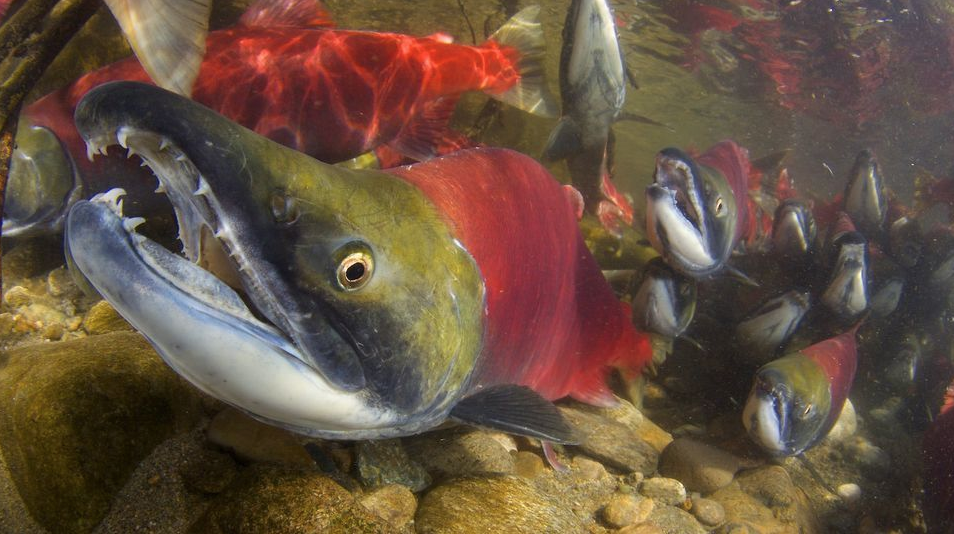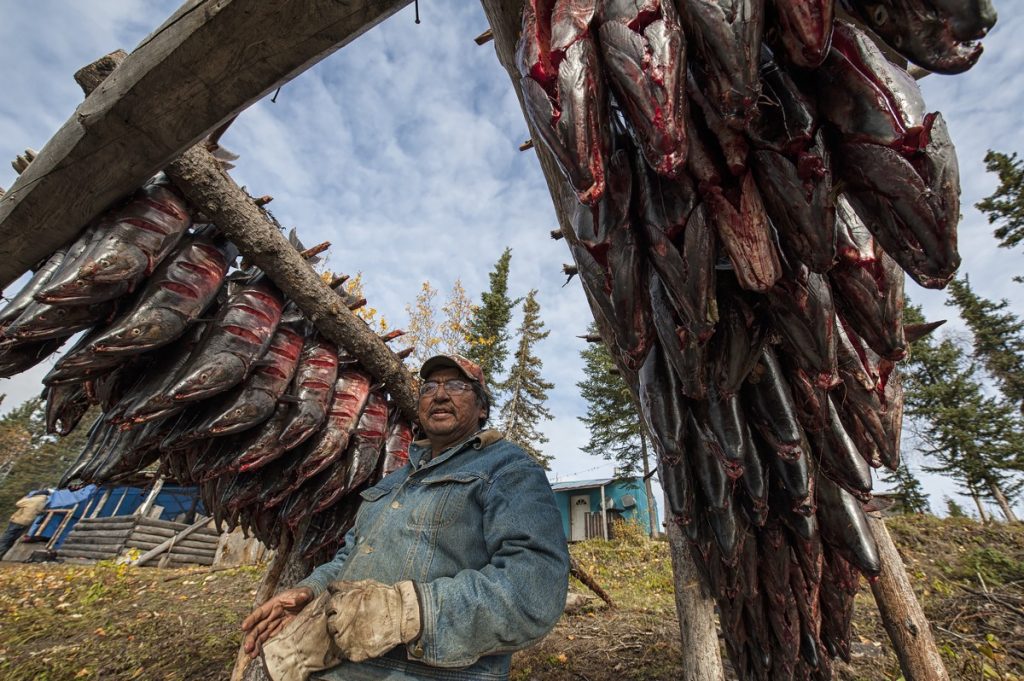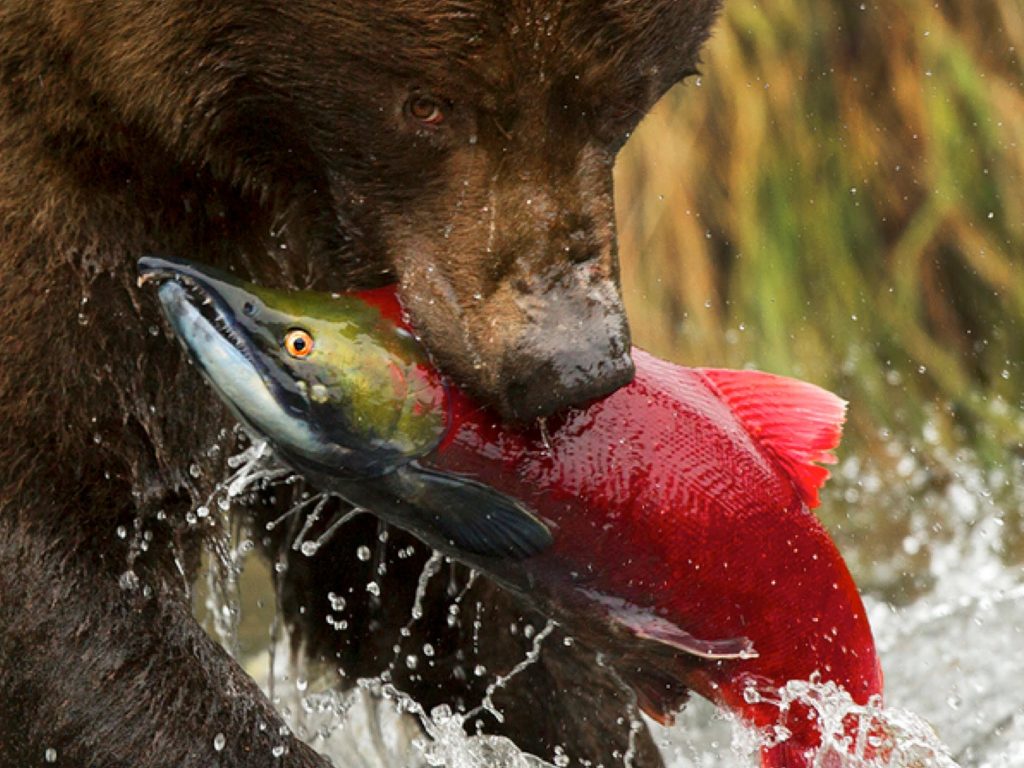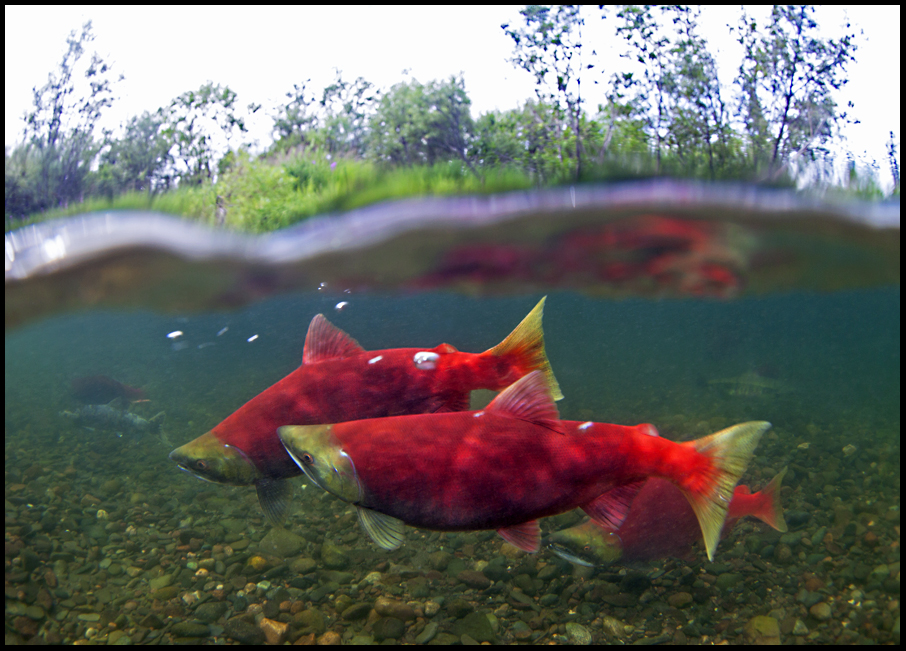Colossal Pacific Salmon Run Reduced to Rubble — Climate Change To Blame Say Scientists

(EnviroNews Nature) — British Columbia, Canada – Salmon returning to the Fraser, the longest river in British Columbia (BC), were at their lowest level since record keeping began this fall. Fewer than 900,000 sockeye (Oncorhynchus nerka) are projected to have returned to their traditional breeding grounds, causing commercial and First Nations fisheries to shut down completely.
2016’s total equals the worst salmon run in BC’s history, and beats the disastrous numbers from 2009 – a run that contained only 1.3 million fish. Even that number, a figure over 30 percent greater than this year’s sum, prompted the launching of the Cohen Commission – a special emergency investigative working group set up by Canada’s federal government, charged with determining the cause of the crisis.
While 2.2 million specimens were expected to return to the area this fall, a place that harbors the largest sockeye salmon run in the world, the actual number that made it home was estimated at 853,000 by the Pacific Salmon Commission. The lack of fish is being blamed on warmer ocean waters, which have come as a result of a global rise in the Earth’s temperature, according to Dr. David Suzuki, a geneticist, environmentalist and award-winning scientist.
“Sockeye salmon are sensitive to temperature changes, so higher ocean and river temperatures can have serious impacts. Even small degrees of warming can kill them,” writes Suzuki for EcoWatch.
“There’s been very tough ocean conditions for salmon over the past few years due to the warm ‘blob’ in the Pacific, a giant mass of much warmer than average water,” said Aaron Hill, Executive Director of Watershed Watch Salmon Society.
While some leading U.S. officials, like GOP Senate Environment and Public Works Committee Chairman James Inhofe, still claim climate change is a “hoax,” villages, fishers and economies along the Fraser are feeling the effects of the “hoax” right now. Republican presidential candidate Donald Trump has taken this notion even further by suggesting global warming is a conspiracy perpetrated by China to make U.S. manufacturing noncompetitive – a sentiment not shared by the vast majority of fishing families affected near the Fraser.
In a statement to Metro News, Bob Chamberlain, Vice Chairman of the Union of B.C. Indian Chiefs, and the elected Chief Council of the Kwicksutaineuk Ah-kwa-mish First Nation said, “every time there’s a low return on sockeye, First Nations of the coast and up the Fraser River, and up the river systems, are going to have to go without food for the winter.”

Politicians using snow in Texas and Boston in an attempt to show global warming doesn’t exist are of no help to those whose livelihoods are linked to the running of salmon in BC, especially considering some members of the First Nations community may face hunger and possibly worse over the next winter, due to lack of their main food source — the sockeye salmon.
According to Suzuki and others, the warmer environment in the Pacific Ocean has created an opportunity for typically foreign predators to move in on the sockeye’s feeding grounds this year, while also harboring far fewer prey than usual for the salmon – all due to unprecedentedly warm waters.
If facing the dangerous conditions of a warmer ocean wasn’t enough, according to Metro News, the salmon run was also hit with a second year of lighter than average snow pack. This lack of snow has caused river waters to heat up too, which in turn, further endangers the salmon’s chances of making it home to their spawning grounds.

An increase in sockeye-socking parasites, like sea lice, has also been connected to higher temperatures. Fishing farms have been linked to the spread of diseases as well, being blamed for an increase in heart and muscle inflammatory maladies. These factors add further fuel to the environmental fire in an already perfect storm of ecological destruction for the sockeye. The effect of these additional stressors on an aquatic creature that depends on its swimming ability to thrive can make it hard for an afflicted fish to survive at all.
Of course, corporations and First Nations tribes weren’t the only ones affected by the shutdown. Sport fisherman protested against the closure of the river, saying that selective fishers shouldn’t be kept from enjoying their sport. However, the Department of Fisheries and Ocean said the number of salmon was just too low to allow any more stress on the few fish that were making their way to the spawning grounds — especially since another cause of the plummet has been overfishing.

The decline in sockeye available at the market can also affect fish eaters in a surprising way. While prices should be expected to increase, consumers may also expect to find fish falsely labeled as sockeye. As reported earlier by EnviroNews World News, as much as 20 percent of all fish for sale is incorrectly labeled. That mislabeling is, many times, both intentional and fraudulent, and is usually the greed-driven result of everyone in the fishing supply chain wanting to make more money. Consumers should beware that it is possible to purchase an inferior fish, or even a swapped-in species masquerading as sockeye, under false pretenses, at a premium price.
While British Columbia has a plan in place to address climate change and fish farms, critics say the proposal doesn’t do enough and won’t successfully save the Pacific Northwest’s epic salmon runs for the ecosystem and future generations. Some opponents of the plan specifically want to see a higher provincial carbon tax. At the federal level, the government has said it would act on the recommendations of the Cohen Commission, first published in 2012. In addition to other concerns, those recommendations also fail to address the problem of fishing farms.
YOU MAY ALSO LIKE
Feat of Engineering: ‘Salmon Cannon’ Explodes across Internet as Fish Get Free Ride over Dams
(EnviroNews USA Headline News Desk) – Fish are being fired upriver by an innovative “cannon” of sorts, flinging them over manmade obstacles – obstructions that in some cases, have denied salmon their native habitats for nearly a century. And although the “salmon cannon” has been in effect and…
FRAUD REPORT: Something Fishy in the Seafood Industry – 20% of All Fish Mislabeled
(EnviroNews World News) – According to a report from Oceana, titled, “Deceptive Dishes: Seafood Swaps Found Worldwide,” about 20 percent of all seafood is wrongly labeled by the time it reaches consumers. The mislabeling occurs at every level of the industry, from the time a fish is caught,…
New Crab Species Discovered at Market Highlights Problems With Unregulated Fishing Industry
(EnviroNews World News) – Guangdon Province, China – Scientists announced this month that they made a slightly disturbing discovery at a fish market in Northern Guangdon, China, where they found what they suspected was a new species of crab. DNA testing confirmed the scientists’ suspicion, but the uncovering…
Phenomenal and Competitive Wildlife Party Goes Down on Alaska’s Final Frontier
FILM AND ARTICLE CREDITS
- Shad Engkilterra - Journalist, Author


![Leading the Charge for America’s Wild Horses on Capitol Hill: NBA/NFL Celeb. Bonnie-Jill Laflin: ‘[Politics] won’t stop us from fighting’](https://cf-images.us-east-1.prod.boltdns.net/v1/static/1927032138001/f46b2158-cead-47f0-ab44-4b027059411a/4e4afcf2-937d-4a9d-acba-1b82e2efd4c6/160x90/match/image.jpg)



1 thought on “Colossal Pacific Salmon Run Reduced to Rubble — Climate Change To Blame Say Scientists”